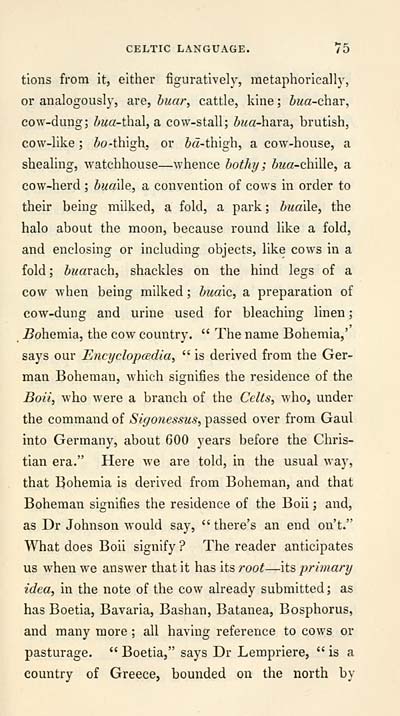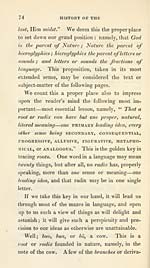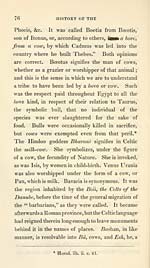Download files
Complete book:
Individual page:
Thumbnail gallery: Grid view | List view

CELTIC LANGUAGE. 75
tions from it, either figuratively, metaphorically,
or analogously, are, buar^ cattle, kine ; hua-chax,
cow-dung; iwa-thal, a cow-stall; Jwa-hara, brutish,
cow-like ; io-thigh, or 6«-thigh, a cow-house, a
shealing, watchhouse — whence bothy; bua-clvWe, a
cow-herd ; bud][e, a convention of cows in order to
their being milked, a fold, a park; buciile, the
halo about the moon, because round like a fold,
and enclosing or including objects, like cows in a
fold ; bua\'-Ath, shackles on the hind legs of a
cow when being milked ; bua'ic, a preparation of
cow-dung and urine used for bleaching linen ;
J5ohemia, the cow country. " The name Bohemia,'
says our EncyclopcBdia^ " is derived from the Ger-
man Boheman, which signifies the residence of the
Boii, who were a branch of the Celts, who, under
the command of Sigonessus, passed over from Gaul
into Germany, about 600 years before the Chris-
tian era." Here we are told, in the usual way,
that Bohemia is derived from Boheman, and that
Boheman signifies the residence of the Boii ; and,
as Dr Johnson would say, " there's an end on't."
What does Boii signify ? The reader anticipates
us when we answ^er that it has its root — its primary
idea, in the note of the cow already submitted ; as
has Boetia, Bavaria, Bashan, Batanea, Bosphorus,
and many more ; all having reference to cows or
pasturage. " Boetia," says Dr Lempriere, " is a
country of Greece, bounded on the north by
tions from it, either figuratively, metaphorically,
or analogously, are, buar^ cattle, kine ; hua-chax,
cow-dung; iwa-thal, a cow-stall; Jwa-hara, brutish,
cow-like ; io-thigh, or 6«-thigh, a cow-house, a
shealing, watchhouse — whence bothy; bua-clvWe, a
cow-herd ; bud][e, a convention of cows in order to
their being milked, a fold, a park; buciile, the
halo about the moon, because round like a fold,
and enclosing or including objects, like cows in a
fold ; bua\'-Ath, shackles on the hind legs of a
cow when being milked ; bua'ic, a preparation of
cow-dung and urine used for bleaching linen ;
J5ohemia, the cow country. " The name Bohemia,'
says our EncyclopcBdia^ " is derived from the Ger-
man Boheman, which signifies the residence of the
Boii, who were a branch of the Celts, who, under
the command of Sigonessus, passed over from Gaul
into Germany, about 600 years before the Chris-
tian era." Here we are told, in the usual way,
that Bohemia is derived from Boheman, and that
Boheman signifies the residence of the Boii ; and,
as Dr Johnson would say, " there's an end on't."
What does Boii signify ? The reader anticipates
us when we answ^er that it has its root — its primary
idea, in the note of the cow already submitted ; as
has Boetia, Bavaria, Bashan, Batanea, Bosphorus,
and many more ; all having reference to cows or
pasturage. " Boetia," says Dr Lempriere, " is a
country of Greece, bounded on the north by
Set display mode to: Large image | Transcription
Images and transcriptions on this page, including medium image downloads, may be used under the Creative Commons Attribution 4.0 International Licence unless otherwise stated. ![]()
| Early Gaelic Book Collections > Blair Collection > History of the Celtic language > (81) |
|---|
| Permanent URL | https://digital.nls.uk/76179500 |
|---|
| Description | A selection of books from a collection of more than 500 titles, mostly on religious and literary topics. Also includes some material dealing with other Celtic languages and societies. Collection created towards the end of the 19th century by Lady Evelyn Stewart Murray. |
|---|
| Description | Selected items from five 'Special and Named Printed Collections'. Includes books in Gaelic and other Celtic languages, works about the Gaels, their languages, literature, culture and history. |
|---|

